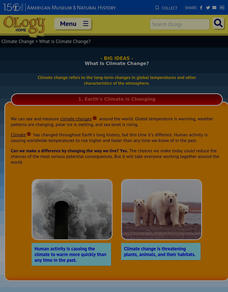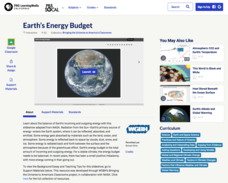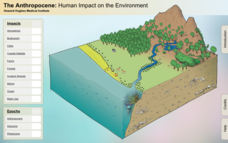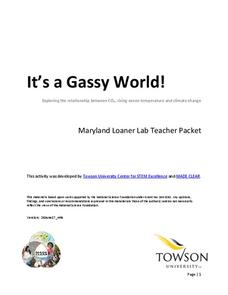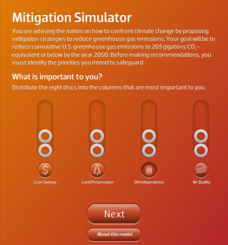British Council
Farming and the Environment
What is the connection between farming and the environment? Scholars complete a worksheet to learn about the environmental impacts of farming. Next, individuals assume the identity of someone within a farming community and role play...
British Council
Storm coming!
A storm is brewing. Scholars use the resource to listen to news reports about extreme weather events from different parts of the world. Pupils then role play an emergency meeting to save their town from a dangerous weather emergency.
American Chemical Society
Climate Change and the Keeling Curve
Global warming has long been in the making. A thorough review of decades of research helps pupils discover the weather patterns of global warming. Learners then connect the weather changes to data in the Keeling Curve that reveals trends...
NASA
The Big Climate Change Experiment Lesson 3: Climate Change Lines of Evidence
Consider the preponderance of evidence when making a verdict. The third of five lessons in Unit 1: The Big Climate Change Experiment focuses on the evidence for climate change. Learners study graphs, diagrams, and pictures regarding...
NASA
The Big Climate Change Experiment Lesson 1: Pre-Exploration
Most have heard of climate change, but what does it really mean? Scholars first answer a set of pre-assessment questions about climate change to help instructors gauge how much they know. They listen to a video lecture, watch a news...
American Museum of Natural History
Ask a Scientist About Our Environment
Let's ask an expert! Scientists at the American Museum of Natural History field questions about the environment in an interactive resource. Question topics range from global warming and conservation to endangered species and habitats.
American Museum of Natural History
Be an Energy Saver
Small conservation steps can have large impacts. Individuals access an online checklist and rate themselves on their conservation practices. They reflect on current practices and learn about new ways to contribute and how to do better....
American Museum of Natural History
Rising CO2! What Can We Do?
It is colorless and scentless, but it makes a large impact on the environment. Learners explore carbon dioxide emissions and what they mean for the environment using an interactive graph. They review changes over time and how they impact...
American Museum of Natural History
What do you Know About Climate Change?
Test the class's knowledge of the key components of climate change. A 10-question online quiz asks learners about weather, climate, greenhouse gases, and several other concepts related to climate change. Interactive and easy for...
American Museum of Natural History
What Is Climate Change?
So many factors show that climate change has arrived. Learners read through an online resource that explains the data and the consequences of climate change. They also review strategies for slowing or even reversing the global influence.
Constitutional Rights Foundation
Global Warming and the Paris Agreement
Global warming: a political debate or a scientific fact? Young historians read text, complete activities, and participate in group discussion to understand the political debate surrounding global warming and the US decision to withdraw...
American Museum of Natural History
Ask a Scientist About Our Environment
Scientists respond to 26 question posed by learners. These experts answer in easy to understand language, include photos to illustrate the issue, offer suggestions for how young people can make a difference, and supply links to resources...
Curated OER
Climate Change
Rising sea levels, strong storms, melting ice ... who or what is to blame? Scholars browse the website in preparation for a class discussion or debate about whether human activity is causing climate change. They gain a balanced...
Howard Hughes Medical Institute
Coral Reefs in Hot Water
Global warming is leaving coral reefs in hot water. What does that mean for their survival? Find out as scholars use authentic satellite data to explore the issue. Learners look for global trends in the data and research the effects the...
Serendip
Food, the Carbon Cycle and Global Warming
As the world population increases, demands on the carbon cycle also increase. A well-designed lesson first explores the greenhouse effect and its impact on global warming. Further sections have pupils study the effect of greenhouse gases...
California Academy of Science
The Heat is On: Cause and Effect and Climate
The higher the number of letters in the final word for the National Spelling Bee, the higher the number of people killed by venomous spiders. Obviously, those two facts correlate, but no causation exists. Scholars view data based on...
PBS
Earth’s Energy Budget
Is Earth's energy flow a little off balance? Explore our energy budget using a click-through interactive. Scholars discover the many factors that move solar energy around the planet and why the system is no longer in equilibrium.
Deliberating in a Democracy
Recycling
How often have you passed by a recycling container in your school? Scholars research the issue of recycling in the ever-changing global world. Using documentation and video evidence, they form their own opinions on recycling and how it...
Howard Hughes Medical Institute
The Anthropocene: Human Impact on the Environment
Will human existence define an epoch? Many scientists think we are in a new epoch, the anthropocene, defined by humans and our impact on the environment. An online interactive demonstrates the immense impact humans have had on every part...
Towson University
Looking Backwards, Looking Forward
How do scientists know what Earth's climate was like millions of years ago? Young environmental scholars discover how researchers used proxy data to determine the conditions present before written record. Grouped pupils gain experience...
Towson University
It's a Gassy World!
How much does your class know about the relationship between climate change and carbon dioxide? Science scholars explore the nature of greenhouse gases and rising ocean temperature through demonstrations, research, and experiments. The...
Polar Trec
Drawing Diatoms like Ernst Haeckel
Why do scientists rely on drawings rather than just photographs of their research studies? The lesson introduces drawings of microscopic organisms and the importance of accuracy. Young artists draw organisms and learn why focus and...
Discovery Education
STEM Camp—Urban Infrastructure
Build a bridge to learning in a STEM-aligned unit about urban infrastructure. Young engineers explore the many aspects of civil planning and design in a five-day unit. Content includes the challenging aspects of balancing building with...
National Academy of Sciences
Mitigation Simulator
The United States has more per capita emissions than any other country in the world. An eye-opening simulation encourages users to explore environmental goals and factors that affect climate change by balancing different priorities....











